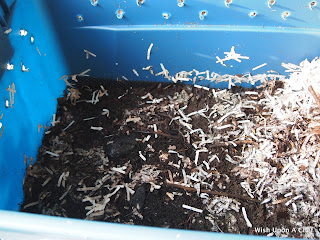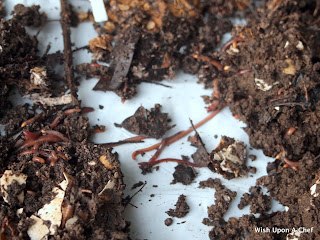Sometimes the Boy Toy will entertain me with a story from his younger years - a scuffle with rowdy patrons in a bar or a crush he had on a girl with green hair and who wore "gobs" of mascara - and I wonder how in the world he ended up with the likes of boring ole' me.
I'm a 40-too-many-year-old, childless, drama free, sedan driving girl who works a steady job, pays her bills on time and goes to bed every night by 11pm (okay, okay, I'll admit to dozing off around 10:15 on most nights.) Given the choice, I'd prefer to stay home in my stretchy pants and play in my kitchen or work in my garden versus going out for a night on the town. I'm thinking, though, that I'm the type of girl that a guy like Boy Toy (who's had about all the drama he can stand for one lifetime) seeks out at a certain point in life and (hopefully) ends up living happily ever after with. And I don't see it as a bad thing at all that someone has "settled" for me because I'm interested in spending my days with someone who's worked through all the rowdiness and green-haired girls and can appreciate a good stable girl like myself.
Probably the most exciting thing about me is that I have a worm farm (and I secretly believe that's what keeps him so attracted to me.) People get a little weirded out when I talk about my worms - they give me that look like I've just told them a story about being abducted and probed by aliens and I'm trying to find my way back from the mothership. They are secretly thinking to themselves what a kook I am but it's just because they just don't understand the excitement of composting.
It was just a little over a year ago that I took a free vermicomposting workshop at the local library and learned that for very little cost I could create a "worm farm" and turn my kitchen scraps into nutrient-rich fertilizer for my flower and vegetable gardens. I discussed setting up a compost bin in this post and about introducing worms to their new home and then I talked about feeding and maintaining the worms, so if you need to get all caught up with the program go right ahead because the time has come to harvest the compost.
I harvested once before but I was too lazy to document the process and now that I've done it once, I realize what an undertaking it is and have decided that I will probably only do it twice a year from now on because it takes just as much time to harvest a little bit of compost as it does to harvest alot. I'll be honest and say this is my least favorite part of composting only because it is time consuming but at the same time it is the most rewarding because your plants will soon perk up and flourish with the addition of the rich soil.
A few weeks before you want to collect your compost, start feeding the worms on only one side of the bin. This will force the worms to migrate to that side of the bin and allow you to collect from the other side and not have to deal with separating so many of the worms (there will still be plenty to deal with that don't get the memo that they need to relocate.) Push the paper shreds away until you see the dark, rich soil.
Using trash bag or something disposable of the sort, scoop out a workable amount of the compost and lay it on the bag. You are basically going to be sorting through the compost to separate the worms and put them back into the bin. You may also have some bits of scraps that aren't fully composted yet (I had alot of egg shells) that you'll want to pick out and throw back into the bin. And yeah, you'll want to wear some rubber gloves.
You'll notice at first that the worms are intermingled at the top of the pile of compost but leave them alone for a few minutes and they'll migrate down through the dirt to get away from the light. Scrape off a layer of compost and let the worms migrate a little further down and scrape again. It's a slow process, but you what else to you have to do on a Sunday afternoon?
There will be plenty of worms who sacrifice their lives for the cause of harvesting great compost because if you're like me, you'll start out lovingly returning the worms to the bin and after realizing that you are spending the day sorting through the worm crap of life, you won't give a flip if one or ten or fifty worms lose their life. Most of my compost was added to my garden beds and much to my amazement I had ten thousand tomato plants spring up from the seeds that were in the compost. Had I not already been up to my eyeballs in ripening tommy toes, I would have left them but a girl can only eat so many tomatoes. What compost I didn't spread in my beds, I kept to make "worm tea" for my house plants.
So, yeah. I'm the kooky girl with the worm farm but I've got some wicked awesome plants and I know you secretly find that attractive.
How to create tea from worm casings
You will need: collected compost from a worm bin, cheesecloth, a large bucket, some water, and a squirt bottle. You will use about a cup of compost per gallon of water for this "recipe."
You can start with this simple brewing process by following these easy steps:
- Use enough cheesecloth to tie the compost in "tea bag" fashion.
- Submerge the bag in a bucket of water. It is best to use collected rainwater but if you are using regular tap water, let the water sit for a day or two so the chlorine with dissipate.
- Dip the bag into the water a couple of times to aerate the solution and allow the nutrients to be diluted into the water.
- As soon as the dilution process is finished (the water will turn an amber color), you can then transfer the tea into a spray bottle.
- You can spritz your plants with this liquid fertilizer or water them directly.














0 comments:
Post a Comment